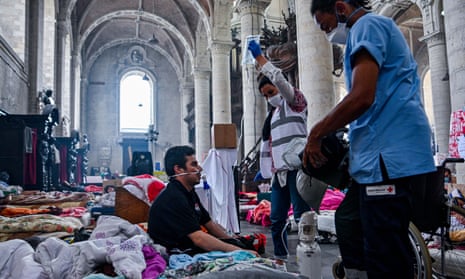The Belgian government is under pressure to offer residence permits to several hundred migrants, some of whom are “between life and death” after a weeks’ long hunger strike in Brussels.
Undocumented migrants have been on hunger strike in a central Brussels church and university buildings for nearly 60 days in an attempt to secure residency papers.
Alarm about their condition is growing, especially after some began to refuse water last Friday. At least four men stitched their lips together last month to press their case for legal access to the jobs market and social services.
On Monday, two United Nations officials urged the Belgian government to offer temporary residence permits to the hunger strikers, who NGOs say number 476 people.
“The information we have received is alarming and several of the hunger strikers are between life and death,” said the UN special rapporteur on human rights and extreme poverty, Olivier De Schutter.
About 150,000 sans papiers live in Belgium, according to the campaign group We Are Belgium Too, which is calling for theregularisation of undocumented migrants, many of whom it says have been in the country for between five and 10 years or more.
The snowballing political row threatens the government, after Socialists threatened to walk out of the seven-party coalition. Pierre-Yves Dermagne, a deputy prime minister, said he and other Socialist ministers would quit the government if any of the hunger strikers died. The Ecolo party has made a similar threat, threatening to topple the “Vivaldi” coalition led by the prime minister, Alexander De Croo, which was sworn in last September.
Belgium’s minister for asylum and migration, Sammy Mahdi, has refused to grant a blanket amnesty to all undocumented workers in the country, but has created a “neutral zone” near the baroque church that is housing some of the hunger strikers, where they can receive information on how they could secure residency status.
“At a time when people are putting their lives in danger it is necessary to explain the rules well and to say what to do and what not to do,” Mahdi said. “The neutral zone is very important to explain to them for which reasons they have a chance to obtain regularisation or not.”
De Croo has expressed full confidence in his minister, while allies in his Flemish liberal party have attacked the threat to bring down the government as “irresponsible and incomprehensible”.
Belgium’s last permanent government, led by the francophone liberal Charles Michel, was frequently beset by splits over migrants and eventually collapsed over a row about a UN migration pact.
The political row ignited as Belgium holds a day of national mourning for victims of last week’s devastating floods that De Croo said were “without any precedent in our country”. According to the official toll, 31 people died in the floods and 70 remain missing.
De Croo and his senior ministers were due to join King Philippe for a ceremony in Verviers, a city in eastern Belgium where streets became dirty brown torrents of water. The total death toll in western Europe stands at nearly 200, with 165 confirmed dead in neighbouring Germany.
